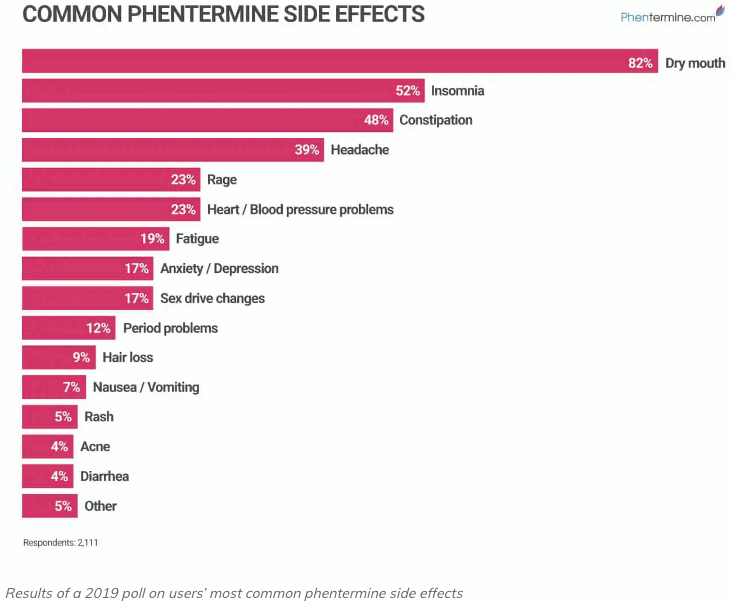[ Home ] [ Controlled Substances ] [ Stimulants ]
PHENTERMINE
|
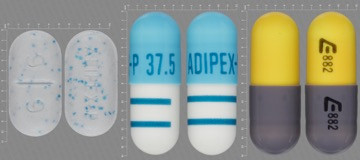
Phentermine - approved in 1959 and now made by several manufacturers - commands 80 percent of the market for diet drugs. Phentermine is inexpensive, often going for about $30 for a month's supply. The newer drugs, by contrast, can cost hundreds of dollars a month and are sometimes not covered by insurance. In the 1990s, phentermine was used as one half of the combination treatment known as fen-phen, the weight-loss sensation that was later discovered to cause heart-valve problems in some patients. The other two drugs commonly used in the treatment, fenfluramine and dexfenfluramine, were withdrawn from the market. Phentermine, which was not linked to the heart problem, was allowed to remain available. The drug is viewed as effective and relatively safe to help jump-start diets in patients who are obese. However, phentermine - a stimulant that can give users an inexpensive high - has a long history of misuse. It has also frequently flown under the radar of regulators, who tend to focus their resources on deadlier drugs like opioid painkillers.
Because phentermine was approved at a time when drug companies weren't held to the same standards as new drugs, little is known about the drug through formal trials.

https://www.nytimes.com/2015/07/05/business/top-selling-diet-drug-phentermine-is-cheap-and-easy-to-get.html
While eating a well-balanced, reduced-calorie diet and exercising regularly are the cornerstones of weight loss, certain drugs can serve as powerful adjuncts. One such drug is phentermine
one of the most popular weight loss drugs in the world
It has been proven effective for short-term weight loss when used alongside a reduced-calorie diet and exercise.
- Phentermine is a prescription weight loss medication.
- It was approved by the FDA in 1959 for short-term use of up to 12 weeks for people older than 16.
- In the 1990s, phentermine was combined with other weight loss drugs. This drug combination was commonly called fen-phen.
- After reports of significant heart problems in users, the FDA pulled the other two drugs used in the treatment - fenfluramine and dexfenfluramine - from the market.
- Phentermine goes by the brand names Adipex-P, Lomaira, and Suprenza, or you can find it in combination medications for weight loss, such as Qsymia.
- It's a controlled substance due to its chemical similarities to the stimulant amphetamine - making it available only with a prescription.
- Your doctor may prescribe phentermine if you're obese, meaning that your body mass index (BMI) is greater than or equal to 30.
- It may also be prescribed if you're overweight with a BMI greater than or equal to 27 and have at least one weight-related condition, such as high blood pressure, high cholesterol, or type 2 diabetes.
Summary:
Phentermine is an FDA-approved drug intended for weight loss. Its chemical structure is similar to amphetamine, and it's only available with a prescription.

https://www.healthline.com/nutrition/phentermine-weight-loss
How should this medicine be used?
Phentermine comes as tablets and extended-release capsules. It usually is taken as a single daily dose in the morning or three times a day 30 minutes before meals. Follow the directions on your prescription label carefully, and ask your doctor or pharmacist to explain any part you do not understand. Take phentermine exactly as directed. Most people take phentermine for 3 to 6 weeks; the length of treatment depends on how you respond to the medication. Phentermine can be habit-forming. Do not take a larger dose, take it more often, or take it for a longer period than your doctor tells you to. If you are taking the extended-release (long-acting) tablets, do not split, chew, or crush the tablet. There are some tablets that can be crushed and mixed with food.

https://medlineplus.gov/druginfo/meds/a682187.html
If I take phentermine will I lose weight?
Phentermine is a powerful tool in the fight against excess weight. Millions of people have used phentermine to help them loose weight and keep it off. It can help you feel more in control of your appetite and food cravings. It can increase your satiety, which means that when you eat you will feel full sooner. And finally, it can help take your mind off food, so that you can think about other things. However, it is not a "magic pill". It is important to remember that it is only a tool, and will work best if you also make healthy life style changes, such as modifying your diet and increasing your activity level. If you take phentermine and do not make lifestyle changes, you may loose some weight, but most likely your weight loss will plateau before you reach your goal, and with time you will regain the weight you have lost.
Is phentermine safe?
Yes. Phentermine has been on the market since 1959 and has been taken by literally millions of patients. It has never been associated with a serious medical condition
Is phentermine addictive?
No. Although, phentermine is chemically related to the amphetamine class of medications, there has never been a documented case of phentermine addiction. Even after long term use of phentermine it is possible to stop taking it abruptly without having physical cravings or other symptoms of withdrawal.
Is phentermine the same thing as fen/phen?
No. Fen/phen was a two drug combination of fenfluramine and phentermine. Fenfluramine is not related chemically to phentermine. Fenfluramine was taken off the market in 1997 because it was thought to cause in some patients a serious complication known as pulmonary hypertension. Phentermine has never been associated with pulmonary hypertension or any other medical complication.


https://healthplustoday.com/wp-content/uploads/2012/11/HP_phentermine_information.pdf
What is Phentermine?
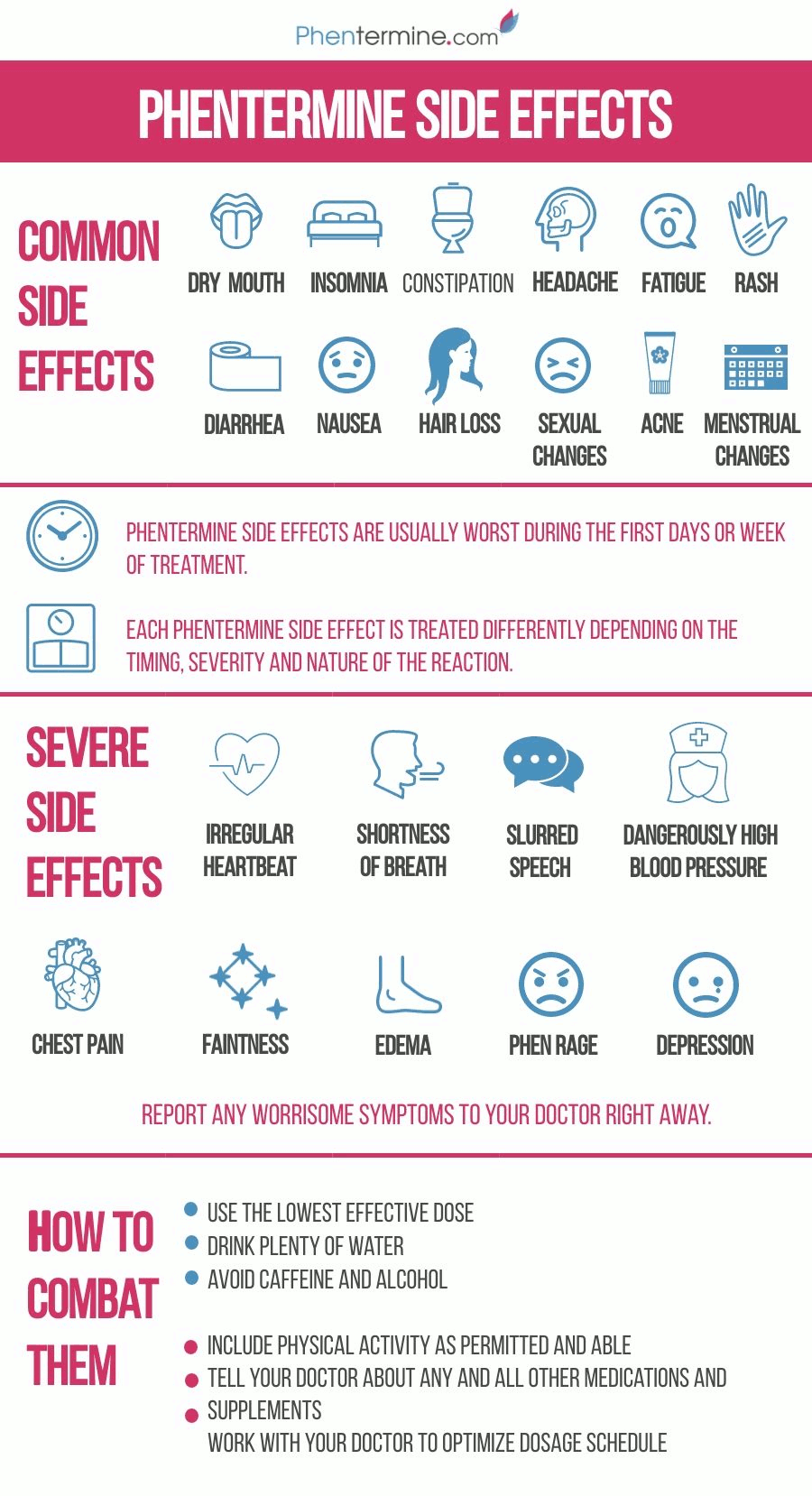
Dry Mouth and Isomnia:
The most common phentermine side effects are dry mouth and trouble sleeping. To that end, a recent online poll of over 2100 phentermine users found that more than 4 in 5 had at least one instance of dry mouth while taking it:
 #1 Pill for Prescription Weight Loss:
#1 Pill for Prescription Weight Loss:
https://www.phentermine.com/
Indications:
Phentermine hydrochloride, USP 37.5 mg is indicated as short-term (a few weeks) adjunct in a regimen of weight reduction based on exercise, behavioral modification and caloric restriction in the management of exogenous obesity for patients with an initial body mass index greater than or equal to 30 kg/m, or greater than or equal to 27 kg/m in the presence of other risk factors (e.g., controlled hypertension, diabetes, hyperlipidemia).

https://dailymed.nlm.nih.gov/dailymed/drugInfo.cfm?setid=3b44d104-a7d0-4366-9d42-63f784f3cb22
GoodRX:
Phentermine (Adipex-P) is an inexpensive drug used to decrease appetite. It is used with a reduced calorie diet and exercise to help you lose weight. It is more popular than comparable drugs. It is available in generic and brand versions. It is not covered by most Medicare and insurance plans.
Commonly Used Brand Names:
- Adipex
- Adipex-P
- Atti-Plex P
- Fastin
- Ionamin
- Lomaira
- Phentercot
- Phentride
- Pro-Fast
Available only with your doctor's prescription.
Comes in four forms: capsules, disintegrating tablets, extended-release capsules, and tablets.- Swallow the extended-release capsule whole. Do not crush, break, or chew it.
- Take the disintegrating tablet with or without food. Make sure your hands are dry before touching the tablet. Place the tablet on the top of your tongue right after removing it from the bottle. It should melt quickly. After the tablet has melted, swallow or take a sip of water.
- Swallow the tablet whole. Do not crush, break, or chew it.

https://www.goodrx.com/phentermine/what-is
Does it work?
Phentermine stimulates certain brain chemicals that tell the body it is full. This may curb appetite sooner and help a person eat less.
- It is a complementary therapy for people who find it hard to lose weight after they make the diet and lifestyle changes to support a moderate weight.
- In many cases, phentermine helps people lose weight.
Since its approval in 1959, it remains one of the most popular prescription weight loss drugs, either alone or as part of a combination therapy.
- The exact mechanism of how phentermine helps suppress appetite is unclear.
Researchers suggest the drug increases neurotransmitter levels in the brain, which decreases hunger.
- Weight loss results may also depend on the person's overall changes to their diet and lifestyle. This includes regular exercise, calorie restriction, and a healthful diet. These changes alone are often enough to cause weight loss, though phentermine may enhance these effects.
- Research notes that people who replaced one meal per day to reduce their calorie intake lost weight. And those who added phentermine to their program lost more weight and had fewer cravings.
- Phentermine is an FDA-approved weight loss drug that remains popular due to its effectiveness. A person who takes it alone or with other drugs may help boost their weight loss.

https://www.medicalnewstoday.com/articles/phentermine-weight-loss#summary
Phentermine is an amphetamine that stimulates neurons to release or maintain high levels of a particular group of neurotransmitters known as catecholamines; these include dopamine and norepinephrine. High levels of these catecholamines tend to suppress hunger signals and appetite. The drug seems to inhibit reuptake of noradrenaline, dopamine, and seratonin through inhibition or reversal of the reuptake transporters. It may also inhibit MAO enzymes leaving more neurotransmitter available at the synapse. Phentermine (through catecholamine elevation) may also indirectly affect leptin levels in the brain. It is theorized that phentermine can raise levels of leptin which signal satiety. It is also theorized that increased levels of the catecholamines are partially responsible for halting another chemical messenger known as neuropeptide Y. This peptide initiates eating, decreases energy expenditure, and increases fat storage. Phentermine is indicated in the management of exogenous obesity as a short term (a few weeks) adjunct in a regimen of weight reduction based on caloric restriction. Phentermine hydrochloride is a sympathomimetic amine with pharmacologic activity similar to the prototype drugs of this class used in obesity, the amphetamines. Actions include central nervous system stimulation and elevation of blood pressure. Tachyphylaxis and tolerance have been demonstrated with all drugs of this class in which these phenomena have been looked for.
 Phentermine:
Phentermine:
https://drugs.ncats.io/drug/C045TQL4WP
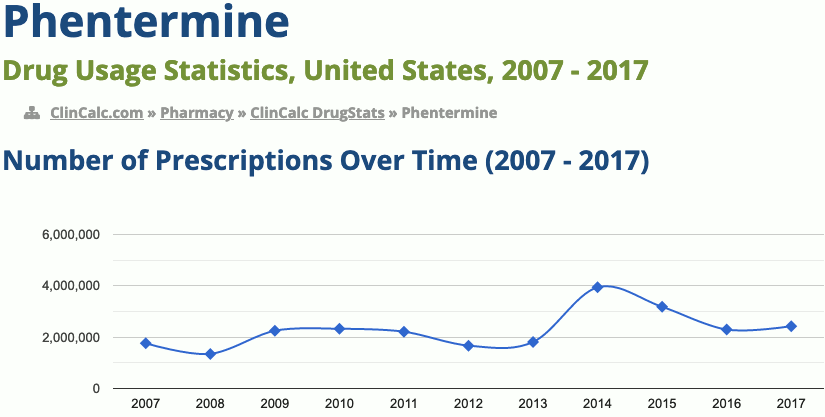
210th most prescribed medicine in the United States for 2017

https://clincalc.com/DrugStats/Drugs/Phentermine
Liver:
Phentermine which has been in clinical use for more than 50 years has not been linked convincingly to either serum enzyme elevations during therapy or to instances of clinically apparent liver injury.
Phentermine Hepatotoxicity:
Phentermine has not been linked to an increased rate of serum enzyme elevations during therapy; however, results of ALT monitoring during phentermine therapy have rarely been reported. Despite long term availability and wide use of phentermine, there have been no published reports linking it to clinically apparent acute liver injury.E Likelihood score: E (unlikely cause of clinically apparent liver injury).
 Phentermine Overview:
Phentermine Overview:
https://www.ncbi.nlm.nih.gov/books/NBK547916/
Q: How long does phentermine stay in your system?

https://www.healthgrades.com/right-care/weight-control-and-obesity/how-long-does-phentermine-stay-in-your-system
Detection Times:
Adipex can be detected in:
- Blood (24 hours)
- Urine (1-4 days)
- Hair (30 days - several months)
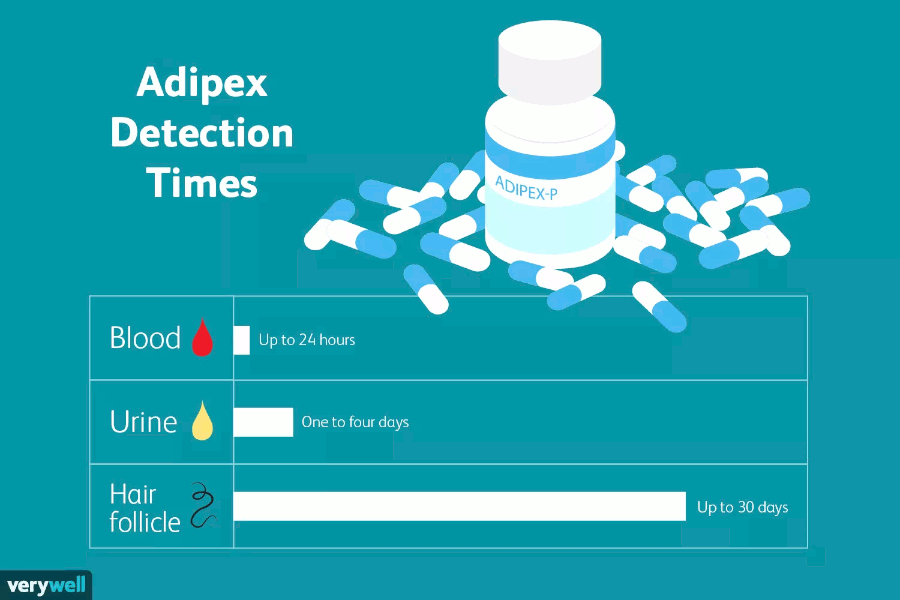
How Long Does It Take to Feel Effects?
Phentermine acts similarly to amphetamines by suppressing the appetite, stimulating the central nervous system, and elevating blood pressure. Phentermine is absorbed through the gastrointestinal tract and reaches peak concentrations in the blood in three to 4.4 hours, by which time you should start feeling the effects, alerting you that the drug is working.
How Long Does Adipex Last?
Adipex has a half-life of about 20 hours

https://www.samhsa.gov/workplace/resources/drug-testing

https://www.amazon.com/Panel-Urine-Drug-test-mAMP/dp/B000OBCSUA

https://www.verywellmind.com/how-long-does-adipex-stay-in-your-system-80217
| Maximum Dosage: | |
|---|---|
| Prescribers Digital Reference | |

Phentermine Hydrochloride - Drug Summary: https://www.pdr.net/drug-summary/Phentermine-Hydrochloride-Capsules-phentermine-hydrochloride-23983 | |
| Adults: | 37.5 mg/day PO. |
| Elderly | 37.5 mg/day PO. May require reduced dosage compared to younger adults. |
| Adolescents: | > 16 years: 37.5 mg/day PO. |
| Adolescents: | <= 16 years: Safety and efficacy have not been established. |
| Children: | Safety and efficacy have not been established. |
Prescribed for:
- Appetite suppressant
Used for:
Phentermine is used with a doctor-approved exercise, behavior change, and reduced-calorie diet program to help you lose weight. It is used by certain overweight people, such as those who are obese or have weight-related medical problems.Losing weight and keeping it off can lessen the many health risks that come with obesity, including heart disease, diabetes, high blood pressure, and a shorter life.
It is not known how this medication helps people to lose weight. It may work by decreasing your appetite, increasing the amount of energy used by your body, or by affecting certain parts of the brain. This medication is an appetite suppressant and belongs to a class of drugs called sympathomimetic amines.Before using:
Tell your doctor or pharmacist your medical history, especially of:
- diabetes
- high blood pressure
- glaucoma
- personal or family history of a substance use disorder (such as overuse of or addiction to drugs/alcohol)
- heart disease (such as chest pain, heart attack, heart murmur, fast/irregular heartbeat, heart valve problems)
- mental/mood problems (such as depression, thoughts of suicide, severe anxiety/agitation)
- high blood pressure in the lungs (pulmonary hypertension)
- stroke
- overactive thyroid (hyperthyroidism)
- kidney disease
- seizures
Precautions:
- This drug may make you dizzy or blur your vision.
- It may also rarely make you drowsy.
- Alcohol or marijuana (cannabis) can make you more dizzy or drowsy.
- Do not drive, use machinery, or do anything that needs alertness or clear vision until you can do it safely.
- Avoid alcoholic beverages.
- Talk to your doctor if you are using marijuana (cannabis).
If you have diabetes, check your blood sugar regularly as directed and share the results with your doctor. Your doctor may need to adjust your diabetes medication during treatment with this drug.
If you are using the tablets made to dissolve in the mouth, your medication may contain aspartame. If you have phenylketonuria (PKU) or any other condition that requires you to limit/avoid aspartame (or phenylalanine) in your diet, ask your doctor or pharmacist about using this medication safely.User Reviews:
2370 Total User Reviews Phentermine Oral Read Reviews Condition: Overweight (2168 Reviews): Effectiveness (4.27) Ease of Use (4.59) Satisfaction (4.12)
 Phentermine HCL (Adipex-P | Ionamin | Pro-Fast):
Phentermine HCL (Adipex-P | Ionamin | Pro-Fast):
https://www.webmd.com/drugs/2/drug-4151/phentermine-oral/details
What is the most important information I should know about phentermine and topiramate?
- Do not use if you are pregnant or if you become pregnant. This medicine may increase the risk of a birth defect called cleft lip and palate in a newborn.
- Topiramate may cause vision problems that can be permanent if not treated quickly. Call your doctor right away if you have a sudden decrease in vision.
- Some people have thoughts about suicide while taking topiramate. Stay alert to changes in your mood or symptoms. Report any new or worsening symptoms to your doctor.
- Tell your doctor if you have fast or pounding heartbeats while you are resting.
 Phentermine and Topiramate:
Phentermine and Topiramate:
https://www.uofmhealth.org/health-library/d07881a1
Important Information:
Do not use phentermine if you are pregnant or breast-feeding a baby.You should not use phentermine if you have glaucoma, overactive thyroid, severe heart problems, uncontrolled high blood pressure, advanced coronary artery disease, extreme agitation, or a history of drug abuse.
Do not use this medicine if you have used an MAO inhibitor in the past 14 days, such as isocarboxazid, linezolid, methylene blue injection, phenelzine, rasagiline, selegiline, or tranylcypromine. A dangerous drug interaction could occur.Avoid driving or hazardous activity until you know how phentermine will affect you. Your reactions could be impaired.
Drinking alcohol with this medicine can cause side effects.
Interactions:
Drug Interactions (168) Alcohol/Food Interactions (3) Disease Interactions (17)
What other drugs will affect Phentermine?
Taking phentermine together with other diet medications such as fenfluramine (Phen-Fen) or dexfenfluramine (Redux) can cause a rare fatal lung disorder called pulmonary hypertension. Do not take phentermine with any other diet medications without your doctor's advice. Many drugs can interact with phentermine. This includes prescription and over-the-counter medicines, vitamins, and herbal products. Not all possible interactions are listed here. Tell your doctor about all your current medicines and any medicine you start or stop using.A total of 168 drugs are known to interact with Phentermine.
- 43 major drug interactions
- 124 moderate drug interactions
- 1 minor drug interaction
 Phentermine Information:
Phentermine Information:
https://www.drugs.com/phentermine.html
Interactions:
- Hypertensive crisis possible with MAOIs.
- Concomitant weight loss drugs, including SSRIs (fluoxetine, sertraline, fluvoxamine, paroxetine): not recommended.
- Caution with alcohol.
- Insulin requirements may be altered.
- May decrease hypotensive effect of guanethidine.

https://www.empr.com/drug/phentermine/
Discontinued brands:
- Fastin
- Oby-Trim
- Obestin-30
- OnaMast
- Tora
- Wilpo
- Obenix
- Suprenza
Drug interactions may occur with some tricyclic antidepressants or monoamine oxidase inhibitors.
Side effects include:
- Palpitations
- High blood pressure
- Hives
- Impotence
- Constipation
- Dry mouth
- Diarrhea
- Vomiting
- Nausea

https://www.medicinenet.com/phentermine/article.htm
| Side Effects: |
| Get emergency medical help if you have signs of an allergic reaction: hives; difficult breathing; swelling of your face, lips, tongue, or throat. |
|---|
| RxList |

Ionamin (phentermine capsules): https://www.rxlist.com/ionamin-drug/patient-images-side-effects.htm |
Call your doctor at once if you have:
|
Common side effects may include:
|
| This is not a complete list of side effects and others may occur. Call your doctor for medical advice about side effects. You may report side effects to FDA at 1-800-FDA-1088. |
Pediatric:
Use of phentermine is not recommended in children 16 years of age and younger.Safety and efficacy have not been established.
Geriatric:
Appropriate studies performed to date have not demonstrated geriatric-specific problems that would limit the usefulness of phentermine in the elderly. However, elderly patients are more likely to have age-related liver, kidney, or heart problems, which may require caution and an adjustment in the dose for patients receiving phentermine.Other Medical Problems:
The presence of other medical problems may affect the use of this medicine. Make sure you tell your doctor if you have any other medical problems, especially:
- Agitated state (very nervous or anxious)
- Arrhythmias (abnormal heart rhythms), history of
- Arteriosclerosis (hardening of the arteries), serious
- Congestive heart failure, history of
- Drug abuse or dependence, history of
- Glaucoma
- Heart or blood vessel disease (eg, coronary artery disease), history of
- Hypertension (high blood pressure) that is not controlled, history of
- Hyperthyroidism (overactive thyroid)
- Stroke, history of - Should not be used in patients with these conditions
- Allergy to tartrazine - Suprenza contains tartrazine. Patients with this condition may have an allergic reaction
- Heart valve disease
- Hypertension (high blood pressure)
- Pulmonary hypertension (elevated pressure in the lungs) - Use with caution. May make these conditions worse
- Kidney disease - Use with caution. The effects may be increased because of slower removal of the medicine from the body
 Phentermine (Oral Route) (Adipex | Adipex-P | Atti-Plex P | Fastin | Ionamin | Phentercot | Phentride | Pro-Fast):
Phentermine (Oral Route) (Adipex | Adipex-P | Atti-Plex P | Fastin | Ionamin | Phentercot | Phentride | Pro-Fast):
https://www.mayoclinic.org/drugs-supplements/phentermine-oral-route/description/drg-20075169
Is phentermine the same as Fen-Phen?
No. Fen-Phen was a medication made of fenfluramine and phentermine prescribed to help people lose weight. Fenfluramine was taken off of the market in September 1997 because of the concern that it caused heart problems. Phentermine is still available.
Is it safe to lose weight while I'm pregnant?
It is not recommended that you lose weight during pregnancy.
Can I breastfeed while taking phentermine?
Phentermine use while breastfeeding has not been studied.

https://mothertobaby.org/fact-sheets/phentermine-pregnancy/
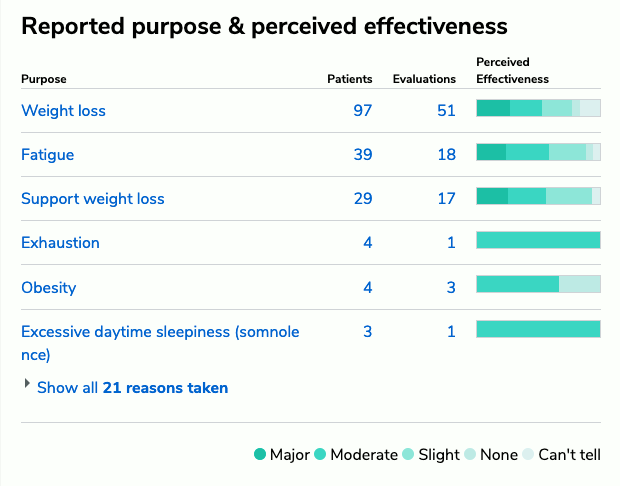

https://www.patientslikeme.com/treatments/detail/phentermine

https://www.everydayhealth.com/drugs/phentermine/reviews

https://www.consumeraffairs.com/nutrition/phentermine.html

https://erowid.org/experiences/subs/exp_Pharms_Phentermine.shtml

https://www.reddit.com/search/?q=Phentermine

https://community.myfitnesspal.com/en/discussion/1200025/anyone-taking-phentermine-37-5

https://www.medschat.com/Discuss/Phentermine/

https://drugs-forum.com/tags/phentermine/
Organic kale, hot yoga...and diet pills? In a wellness-focused world, no one's fessing up. But women are still taking them - and yes, they're still dangerous.
It was like being on meth. That's how Brittany describes the sudden surge of energy that had her crushing it at work and deep-cleaning her house, euphorically scrubbing down walls and scooping up cat litter.
But that wasn't even the best part. The best part, according to Brittany, was the 35 pounds that "just melted right off" her 5'3", 165-pound frame. It took less than three months to shed the weight, and she never even had to step foot in the gym. Instead, she ate whenever she was hungry - it's just that she was never hungry. At meals, she could usually stomach three or four bites before feeling full. Otherwise, she mainly subsisted on grapes and Diet Dr. Pepper.Brittany, who lives in California, wasn't on a low-carb diet or trendy mindfulness plan. Instead, she'd started taking diet pills: phentermine, to be exact, a prescription stimulant and appetite suppressant that she'd heard would help her drop a few sizes effortlessly. "My family doctor gave me a three-month prescription," she says. "I was a little nervous about the side effects - I had read that it wasn't great for your heart - but my excitement to lose weight trumped all those anxieties."
When she first started popping the mint-size meds, Brittany noticed that her heart would race on-and-off for hours, and she'd feel weirdly antsy. This made her uncomfortable - until, just weeks later, she put on a pair of shorts. "I had always been so insecure about my legs," she says. Now she thought she looked good. And well, that made her heart race too.
Not six months later she was down 60 pounds and wearing her skinny jeans. "I did nothing and the weight just...went away," Stacey says, in wonder and amazement. "It was crazy." Most people in her life still think the results happened because - wellness!
In the '90s, when waifish Kate Moss ruled the runways, thin was in, and the tic-tac-clack of weight-loss pills rattling around in women's purses was practically a status symbol. Everyone was particularly obsessed with a combo drug called fenfluramine-phentermine (more popularly known as fen-phen). Marketed as a weight-loss miracle, the drug helped users lose an average of 30 pounds in just a few months. It became a total sensation in the media, attracting such a cult-like following that in 1996, its year of peak use, 18 million prescriptions were written for it. But despite its catchy nickname and miraculous fat-evaporating abilities, the too-good-to-be-true pill did indeed prove to be too good to be true.
Fen-phen was shown to cause heart valve problems in up to one-third of people who used it, in addition to a potentially fatal lung condition called primary pulmonary hypertension. By 1997, the FDA had banned fenfluramine, one of the two drugs contained in the combo, and yanked fen-phen from the market. But not before thousands of people suffered serious side effects and even died, including Mary Linnen, 30, of Massachusetts, who was dead from PPH just ten months after taking fen-phen to lose weight for her wedding. Tens of thousands of legal claims were filed against the makers and distributors of fenfluramine, with pharma company Wyeth ultimately setting aside $21 billion for payouts.
The fen-phen scandal was sufficiently shocking that it scared many women off of weight-loss drugs entirely, in addition to causing doctors to become skittish about handing out prescriptions. The FDA didn't approve any new diet drugs for a decade. Instead, women begrudgingly returned to exercise and fad eating plans. Eventually, a burgeoning "wellness" mega-trend replaced calorie-counting with a GOOP-ish regimen of Spin class, green juice, and "self-care." Nowadays women meditate and preach body positivity and supposedly eat "clean" to gain strength and mental clarity, not a six-pack.
Oh, and they still take diet pills, too.
Phentermine, as it turns out, never went off the market. It has been low-key available on its own ever since fen-phen was pulled. And young women are taking it - even if they're out here on Insta extolling the powers of Peloton. The most recent FDA study, from 2016, found that over 25 million prescriptions for phentermine were dispensed between 2008 and 2011 And the number of prescriptions doubled between 2007 and 2017. Women are taking phentermine, They just don't want to talk about it because it's not a shiny new thing like the Keto plan or intermittent fasting.
Taken solo, the phen half of fen-phen doesn't melt pounds quite as miraculously as the infamous super-drug, but it's still an effective appetite suppressant, helping users lose weight without having to lift a dumbbell.
 (2019 Article) The Secret, Scary Way Your Friends Are Losing Weight:
(2019 Article) The Secret, Scary Way Your Friends Are Losing Weight:
https://www.cosmopolitan.com/health-fitness/a26067574/diet-pills-side-effects-phentermine-weight-loss/
Phentermine is the #1 prescribed weight-loss medicine for nearly 60 years:
Despite the new entrants, phentermine continues to be the most commonly prescribed medicine for weight loss in the United States. Over 7 million prescriptions are written for phentermine yearly by a wide range of healthcare professionals, including obesity medicine specialists, family practitioners, endocrinologists, internists and cardiologists.
The fifth and most recent approval (September 2016) in the battle against the disease of obesity is Lomaira (phentermine hydrochloride USP) 8 mg tablets CIV, a low-dose formulation of phentermine that can be used up to three times a day before meals. Unlike current dosage forms of phentermine HCl [Adipex-P (phentermine hydrochloride USP) CIV and generic phentermine 15 mg, 30 mg, and 37.5 mg] that are dosed in the morning before or shortly after breakfast, Lomaira can be dosed up to three times a day to target eating patterns throughout the day.

https://lomaira.com/phentermine/
Phentermine/topiramate (Qsymia):
Combines a centrally acting appetite suppressant (phentermine) with an antiepileptic agent (topiramate) in an extended-release capsule. It is labeled for use as an adjunct to exercise and a reduced-calorie diet for chronic weight management. Phentermine/topiramate has been shown to be a good option for sustained weight loss in patients who are unable to lose weight with diet and exercise alone. It should not be given to patients with a history of significant heart disease, and women of childbearing age should use contraception and have regular pregnancy tests when taking phentermine/topiramate.

https://www.aafp.org/afp/2014/1015/p576.html


https://qsymia.com/patient/include/media/pdf/prescribing-information.pdf?webSyncID=346e18e2-2873-4598-61a3-a5acbc124ea7&sessionGUID=a8c662c9-1de4-a7e5-98cc-c275c38c4ad6


https://www.adipex.com/globalassets/adipex/adipex_pi.pdf


https://www.accessdata.fda.gov/drugsatfda_docs/label/2012/085128s065lbl.pdf


https://www.accessdata.fda.gov/drugsatfda_docs/label/2013/202088s005lbl.pdf

https://dailymed.nlm.nih.gov/dailymed/search.cfm?labeltype=all&query=Phentermine
Phentermine is only found in individuals that have used or taken this drug.This peptide initiates eating, decreases energy expenditure, and increases fat storage. Belongs to the class of organic compounds known as amphetamines and derivatives.
- It is a central nervous system stimulant and sympathomimetic with actions and uses similar to those of dextroamphetamine.
- It has been used most frequently in the treatment of obesity.
- Phentermine is an amphetamine that stimulates neurons to release or maintain high levels of a particular group of neurotransmitters known as catecholamines; these include dopamine and norepinephrine. High levels of these catecholamines tend to suppress hunger signals and appetite. The drug seems to inhibit reuptake of noradrenaline, dopamine, and seratonin through inhibition or reversal of the reuptake transporters.
- It may also inhibit MAO enzymes leaving more neurotransmitter available at the synapse.
- Phentermine (through catecholamine elevation) may also indirectly affect leptin levels in the brain. It is theorized that phentermine can raise levels of leptin which signal satiety.
- It is also theorized that increased levels of the catecholamines are partially responsible for halting another chemical messenger known as neuropeptide Y.
 Metabocard for Phentermine:
Metabocard for Phentermine:
https://hmdb.ca/metabolites/HMDB0014337
- A medication used together with diet and exercise to treat obesity.
- It is taken by mouth for up to a few weeks. Phentermine is approved for up to 12 weeks of use and most weight loss occurs in the first weeks. However, significant loss continues through the sixth month and has been shown to continue at a slower rate through the ninth month.
- Also available as the combination phentermine/topiramate.
- Common side effects include a fast heart beat, high blood pressure, trouble sleeping, dizziness, and restlessness.
- Consumption of alcohol with phentermine may produce adverse effects.
- Rare cases of pulmonary hypertension and cardiac valvular disease have been reported.
- Tolerance usually occurs; however, risks of dependence and addiction are considered negligible.
- Use is not recommended during pregnancy or breastfeeding.
- It works as an appetite suppressant likely as a result of being a CNS stimulant.
- Chemically, phentermine is a substituted amphetamine.
- Phentermine was approved for medical use in the United States in 1959.
- It is available as a generic medication.
- The wholesale cost of a month supply in the United States is about US $2.55.
- In 2017, it was the 210th most commonly prescribed medication in the United States, with more than two million prescriptions.
- Phentermine was withdrawn from the market in the United Kingdom in 2000 while the combination medication fen-phen, of which it was a part, was withdrawn from the market in 1997 due to side effects.
- Phentermine was marketed with fenfluramine or dexfenfluramine as a combination appetite suppressant and fat burning agent under the popular name fen-phen. In 1997, after 24 cases of heart valve disease in fen-phen users, fenfluramine and dexfenfluramine were voluntarily taken off the market at the request of the FDA. Studies later showed nearly 30% of people taking fenfluramine or dexfenfluramine for up to 24 months had abnormal valve findings.
Phentermine is still available by itself in most countries, including the US. However, because it is similar to amphetamine, it is classified as a controlled substance in many countries.
Everything you need to know about phentermine - Phentermine is a weight loss drug that helps suppress appetite. No prescription can replace a healthful diet and exercise. However, phentermine may help those unable to lose weight through diet and ... Sunday July 12, 2020 - medicalnewstoday.com Phentermine Weight Loss Results: How Long Does it Take for Phentermine to Work to Lose Weight - Phentermine is an FDA approved drug for weight loss, it is arguably the longest serving prescription medication available. In order to be prescribed weight loss drugs you should have a high BMI (Body ... How Much Weight Can You Expect to Lose Using Phentermine and Topiramate? - The combination of phentermine and topiramate (Qsymia) is one of several drugs approved for weight loss in the United States, according to the National Institute of Diabetes and Digestive and Kidney ... Long-Term Phentermine for Weight Loss Appears Safe, Effective - NASHVILLE, Tenn — Long-term, off-label use of the weight-loss drug phentermine appears to be effective and safe, new data suggest. Findings from an electronic record analysis involving nearly 14,000 ... Lorcaserin and Phentermine Safe Combo in Weight-Loss Trial - In a 3-month safety study, combined therapy with the obesity agents phentermine plus lorcaserin (Belviq, Arena Pharmaceuticals/Eisai) did not exacerbate any serotonergic adverse effects seen with ... Where Can I Get Phentermine to Lose Weight? – Phentermine Online and Alternatives - This article will answer your question – “Where can I get Phentermine to lose weight?” in the US or UK. You will also find out how to get a prescription for Phentermine and buy it online. The ... Phentermine Over-The-Counter | Top 6 Phentermine Alternatives you Can Buy - Experts Reviewed - Over-the-counter Phentermine alternatives – are legal nutritional supplements imitating the action of the prescription drug Phentermine – assisting your organism to eliminate excess weight effectively ... FDA drug safety program mitigates prenatal exposure to phentermine-topiramate - Please provide your email address to receive an email when new articles are posted on . Phentermine-topiramate is approved for weight loss, but topiramate’s association with birth defects is well ... Phentermine near Me – Top Vendors of OTC Phentermine Alternatives for Sale in 2021 - For weight loss, phentermine is considered the most tried and best drug that works best for suppressing appetite. Phentermine was once the most prescribed drug for weight loss and so many doctors ... QSYMIA (Phentermine-Topiramate) Drug Insights And Market Forecasts To 2032' - DUBLIN, Jan. 3, 2023 /PRNewswire/ -- The 'qsymia (phentermine-topiramate), drug insight and market forecast - 2032' report has been added to ResearchAndMarkets.com's offering. The report provides ...
| ||
| Stimulants | Link to this page |


